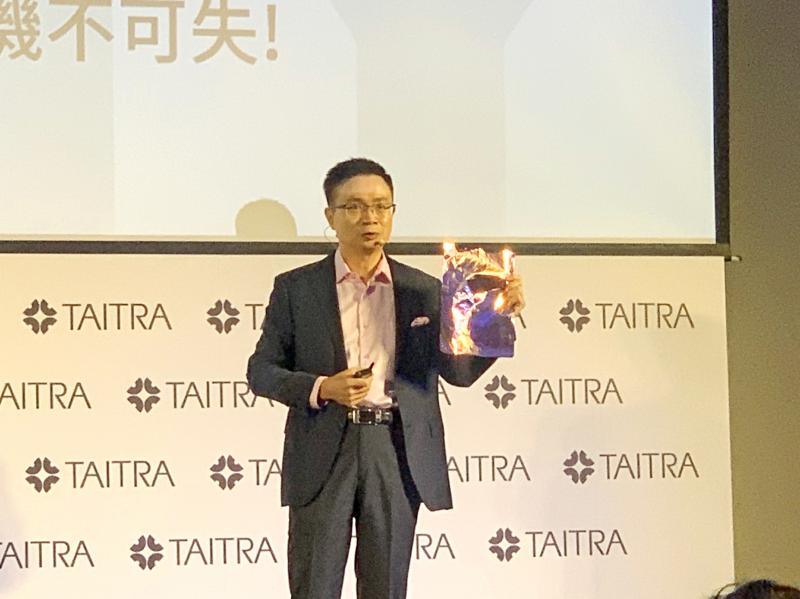Taiwan’s electric vehicle (EV) industry has “three years left” to build its own brand, Taiwan External Trade Development Council (TAITRA, 外貿協會) chairman James Huang (黃志芳) said at a news conference in Taipei yesterday, announcing that the council is to hold an electro-mobility trade show in October.
Although Taiwanese components make up about 75 percent of Tesla Inc’s vehicles, according to the Chinese-language Commonwealth Magazine, there are no Taiwanese EV brands on the market.
“We are looking ahead to 2035 because that is when many countries will be phasing out fossil fuel vehicles,” Huang said. “We all know that Taiwan is strong in EV hardware components, but until we have our own brand, we do not have a voice in the international market.”

Photo: Lin Jing-hua, Taipei Times
The council’s goal is to encourage local firms to build a “connected ecosystem centered on EV and autonomous-driving technology,” Huang said.
The first edition of the 2035 E-Mobility Taiwan Show would help to spark that development and feature local manufacturers and “international investors from Wall Street and Silicon Valley,” he said.
“Taiwan has the hardware supply chain and the software capability... The time has come to combine the two,” Huang said, adding that the nation has three years to “seize the opportunity.”
EVs have in the past few months been a hot topic in Taiwan, with Hon Hai Precision Industry Co (鴻海精密) in October last year announcing the launch of an open platform for EV development.
Hon Hai at the time said that it aims to secure 10 percent of the world’s EV market by 2025.
Hon Hai’s platform is “the Android of EVs,” Huang said, adding that the firm has been positive about participating in the e-mobility show.
In June, TAITRA would hold an “e-mobility demonstration day,” where start-ups and university research groups can demonstrate their projects, and compete for a chance to be included in the e-mobility show.
Huang said that the idea to host an e-mobility show came from Lin Shu-hong (林書鴻), chairman of Chang Chun Group (長春集團), a petrochemical conglomerate that produces copper foils, a vital component in EV batteries.
“Lin told me that the demand for copper foil is through the roof, thanks to demand from EV makers, and that we should build a ‘battery national team,’” Huang said. “Lin also predicts that the demand for lithium-ion batteries will be 28 times what it is today in 2030.”
“The nature of mobility is changing, and Taiwan must not miss this opportunity. The government must support the EV industry in the same way it supported the semiconductor industry in the past,” he said.

TECH BOOST: New TSMC wafer fabs in Arizona are to dramatically improve US advanced chip production, a report by market research firm TrendForce said With Taiwan Semiconductor Manufacturing Co (TSMC, 台積電) pouring large funds into Arizona, the US is expected to see an improvement in its status to become the second-largest maker of advanced semiconductors in 2027, Taipei-based market researcher TrendForce Corp (集邦科技) said in a report last week. TrendForce estimates the US would account for a 21 percent share in the global advanced integrated circuit (IC) production market by 2027, sharply up from the current 9 percent, as TSMC is investing US$65 billion to build three wafer fabs in Arizona, the report said. TrendForce defined the advanced chipmaking processes as the 7-nanometer process or more

China’s Huawei Technologies Co (華為) plans to start mass-producing its most advanced artificial intelligence (AI) chip in the first quarter of next year, even as it struggles to make enough chips due to US restrictions, two people familiar with the matter said. The telecoms conglomerate has sent samples of the Ascend 910C — its newest chip, meant to rival those made by US chipmaker Nvidia Corp — to some technology firms and started taking orders, the sources told Reuters. The 910C is being made by top Chinese contract chipmaker Semiconductor Manufacturing International Corp (SMIC, 中芯) on its N+2 process, but a lack

NVIDIA PLATFORM: Hon Hai’s Mexican facility is to begin production early next year and a Taiwan site is to enter production next month, Nvidia wrote on its blog Hon Hai Precision Industry Co (鴻海精密), the world’s biggest electronics manufacturer, yesterday said it is expanding production capacity of artificial intelligence (AI) servers based on Nvidia Corp’s Blackwell chips in Taiwan, the US and Mexico to cope with rising demand. Hon Hai’s new AI-enabled factories are to use Nvidia’s Omnivores platform to create 3D digital twins to plan and simulate automated production lines at a factory in Hsinchu, the company said in a statement. Nvidia’s Omnivores platform is for developing industrial AI simulation applications and helps bring facilities online faster. Hon Hai’s Mexican facility is to begin production early next year and the

Who would not want a social media audience that grows without new content? During the three years she paused production of her short do-it-yourself (DIY) farmer’s lifestyle videos, Chinese vlogger Li Ziqi (李子柒), 34, has seen her YouTube subscribers increase to 20.2 million from about 14 million. While YouTube is banned in China, her fan base there — although not the size of YouTube’s MrBeast, who has 330 million subscribers — is close to 100 million across the country’s social media platforms Douyin (抖音), Sina Weibo (新浪微博) and Xiaohongshu (小紅書). When Li finally released new videos last week — ending what has